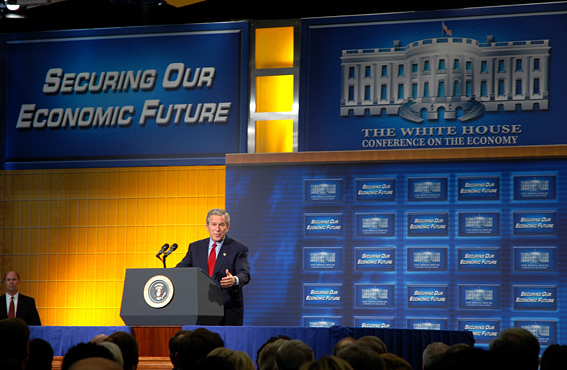President Bush's November 4, 2004 Press Conference
 DEMOCRACY IN ACTION Photo. |
| December 16, 2004 - President Bush delivers closing remarks at the White House Conference on the Economy. |
Following the election President Bush moved quickly and decisively to re-shape his Cabinet, accepting resignations from nine department secretaries in little more than one month. Bush nominated people already serving in the administration to fill most of these positions. However there was one botched nomination; Bush's first choice to replace Tom Ridge at Homeland Security, Bernard Kerik, pulled his name from consideration amid controversy. Defense Secretary Donald Rumsfeld retained the President's support despite statements from some Senators expressing a lack of confidence.
During the transition, Bush made it clear that he intended to tackle big issues in his second term. On December 15 and 16 he convened an economic summit in Washington, DC where he emphasized his determination to address the nation's economic challenges. The conference included six panels: State of Our Economy, Tax and Regulatory Burdens, The High Costs of Lawsuit Abuse, Making Healthcare More Affordable, Financial Challenges for Today and Tomorrow, and Preparing for the Jobs of the 21st Century.
Bush faced many other issues during these weeks. After the landmark Intelligence Reform and Terrorism Prevention Act of 2004 appeared bogged down, Bush worked with Congress to secure its passage; among other provisions the law creates a Director of National Intelligence. On December 23 the White House in a statement announced the President would re-submit to the Senate 20 judicial nominees who did not receive a vote in his previous term. On the international front, Bush held firm to the January 30 date for elections in Iraq, even as violence continued unabated. Bush was criticized by some for his initial response to the devastating tsunamis generated by the December 26 earthquake off the island of Sumatra, but within days he had announced $350 million in aid (December 31), put military assets in the region, dispatched Secretary of State Colin Powell and Gov. Jeb Bush (they arrived January 2), and named former Presidents Clinton and Bush to head up a national effort to foster charitable contributions.
Cabinet Changes
Nominations
Secretary of Homeland Security -- Michael Chertoff (announced Jan. 11, 2005)
Was serving as a U.S. Circuit Judge for the Third Circuit Court of Appeals. Previously served as Assistant Attorney General for the Criminal Division at the Department of Justice following the September 11 attacks. Partner in the law firm of Latham & Watkins. Special Counsel for the U.S. Senate Whitewater Committee, 1994-96. Appointed by President George H. W. Bush to be U.S. Attorney for the District of New Jersey, 1990.
Secretary of Health and Human Services -- Mike Leavitt (announced Dec. 13, 2004)
Was serving as Administrator of the United States Environmental Protection Agency; sworn in on Nov. 6, 2003. Governor of Utah for two full terms and part of a third. President and chief executive officer of a regional insurance firm.
Secretary of Energy -- Sam Bodman (announced Dec. 10, 2004)
Was serving as Deputy Secretary of Commerce and previously served in the Administration as Deputy Secretary
of the Treasury. Joined Cabot Corporation in 1987 and served as Chairman, CEO, and a Director. Named
President and Chief Operating Officer of Fidelity Investments and a Director of the Fidelity Group of Mutual Funds
in 1983. Associate Professor of Chemical Engineering at MIT and as Technical Director of the American Research and Development Corporation, a pioneer venture capital firm.
Secretary of Veterans Affairs -- Jim Nicholson (announced Dec. 9, 2004)
Ambassador to the Holy See (Vatican) for the past three years, sworn in Aug. 10, 2001. Elected chairman of the
Republican National Committee in Jan. 1997 and continued in the position through the 2000 cycle. Nicholson
settled in Colorado where, after a couple of years practicing law, he worked as a residential real estate developer starting in 1978.
Secretary of Homeland Security -- Bernard Kerik (announced Dec. 3, 2004; withdrew Dec. 10, 2004)
Briefly Interim Minister of Interior and Senior Policy Advisor for the Coalition Provisional Authority in Iraq. Partner
with Rudy Giuliani in consulting. Police Commissioner of the City of New York for 15 months starting in 2000,
including the September 11, 2001 attack, and continuing to the end of Giuliani's term. Commissioner of the
Department of Correction for New York City starting in 1997. Joined the New York Police Department in 1986.
Has written an autobiography "The Lost Son: A Life in Pursuit of Justice."
Secretary of Agriculture -- Mike Johanns (announced Dec. 2, 2004)
Elected Governor of Nebraska in November 1998 and re-elected in November 2002. Elected Mayor of Lincoln in
1991 and re-elected in 1995. Elected to the Lincoln City Council in 1989. Elected to a four-year term on the
Lancaster County Board of Commissioners.
Secretary of Commerce -- Carlos Gutierrez (announced Nov. 29, 2004)
Chairman of the Board and Chief Executive Officer of Kellogg Company since 1999. Joined the company in 1975 as a truck driver in Mexico City, Mexico and worked his way up. "Carlos's family came to America from Cuba
when he was a boy. He learned English from a bellhop in a Miami hotel, and later became an American citizen."
Secretary of Education -- Margaret Spellings (announced Nov. 17, 2004)
Assistant to the President for Domestic Policy since the start of the Bush administration. Worked for six years as Gov. George W. Bush's Senior Advisor responsible for developing and implementing education policy.
Secretary of State -- Dr. Condoleezza Rice (announced Nov. 16, 2004)
National Security Advisor to President Bush from January 22, 2001. Provost at Stanford University for six years
through June 1999; on the Stanford faculty since 1981. From 1989 to 1991, during Bush senior's administration,
served as Director, and then Senior Director, of Soviet and East European Affairs in the National Security Council,
and a Special Assistant to the President for National Security Affairs.
Attorney General -- Judge Alberto Gonzales (announced Nov. 10, 2004)
Counsel to President George W. Bush since January 2001. Justice of the Supreme Court of Texas, apppointed in 1999. Texas Secretary of State from December 2, 1997 to January 10, 1999. General Counsel to Governor Bush for three years. Partner with the law firm of Vinson & Elkins L.L.P. in Houston, Texas; joined the firm in June 1982.
Resignations-Nov. and Dec. 2004
"The Cabinet includes the Vice President and, by law, the heads of 15 executive departments-the Secretaries of Agriculture, Commerce, Defense, Education, Energy, Health and Human Services, Homeland Security, Housing and Urban Development, Interior, Labor, State, Transportation, Treasury, and Veterans Affairs, and the Attorney General. Under President George W. Bush, Cabinet-level rank also has been accorded to the Administrator, Environmental Protection Agency; Director, Office of Management and Budget; the Director, National Drug Control Policy; and the U.S. Trade Representative." -from the White House web page
See also...Democrats Do Some Soul Searching

